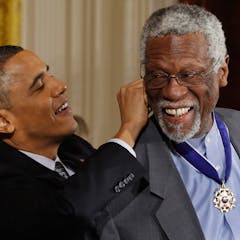
Artículos sobre US slavery
Mostrando 1 - 20 de 40 artículos

Tech companies are offering AI companions as a convenient cure for the loneliness epidemic, but there have been other forms of faux relationships, and they tend to have more to do with ego than heart.

At the turn of the 20th century, Southern sympathizers started building monuments to Confederate leaders. Black newspaper editors saw these emblems clearly for what they stood for – a lost cause.

Much like the history of the US, Joel Roberts Poinsett, after whom the poinsettia is named, had a complicated and troubling history.

Let Us Descend is concerned with the neglected lives of the the poor, the despised, the dark, those barely scraping a living, but cannot capture the collective experience of slavery.

Though it is a fact that some enslaved people learned valuable skills, it’s a myth that they had the same path of upward mobility that white laborers enjoyed.

Florida’s new standards for teaching social studies include throwbacks to an interpretation of slavery as benign or inconsequential.

While a Florida curriculum implies that enslaved Africans ‘benefited’ from skills acquired through slavery, history shows they brought knowledge and skills to the US that predate their captivity.

Tactics used to censor the teaching of American history in Florida schools bear much in common with those seen in the illiberal democracies of Israel, Turkey, Russia and Poland.

Many students say they aren’t learning much about slavery beyond its harsh conditions. A historian explores how Juneteenth offers opportunities to change that reality.

The last relics of ‘lost cause’ ideology are being removed, as a federal panel renames US military bases that honored Confederate generals.

Former enslaved persons have never received a dime for their labor. Nor have their descendants received reparations for the legacy of slavery.
Should the descendants be paid? By whom and how much?

Founding Father and Princeton University president John Witherspoon told American colonists to resist the ‘slavery’ of British rule, even as he held slaves himself.

America’s complicated history with race can be told through the lives and times of Black Americans, a view that some GOP-controlled state legislatures want to restrict, if not outright ban.

Instead of using the secret routes along the Underground Railroad to find freedom in the North, thousands of enslaved Black people fled to free Black communities in Southern slaveholding states.

The GOP leadership renewed its pledge to resist public education that includes painful discussions on race and racism in America.

The events of Jan. 6, 2021, have been called an insurrection. The same word has often been used to describe the mostly forgotten rebellions against plantation owners by enslaved people.

Known as the military leader who saved America, Ulysses S. Grant left a legacy of fighting for the rights of enslaved people during and after the Civil War.

At a time when politicians across the country are debating how slavery in the US is taught, high school students are participating in mock slave auctions that are having severe consequences

Lawmakers are seeking to downplay the role that slavery played in the development of the United States, but history tells a different story.

Known as Juneteenth in Texas, Emancipation Days symbolized America’s attempt to free the enslaved across the nation. But those days were unable to prevent new forms of economic slavery.
